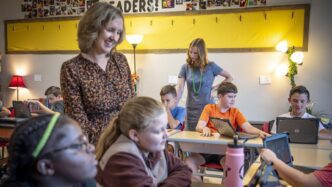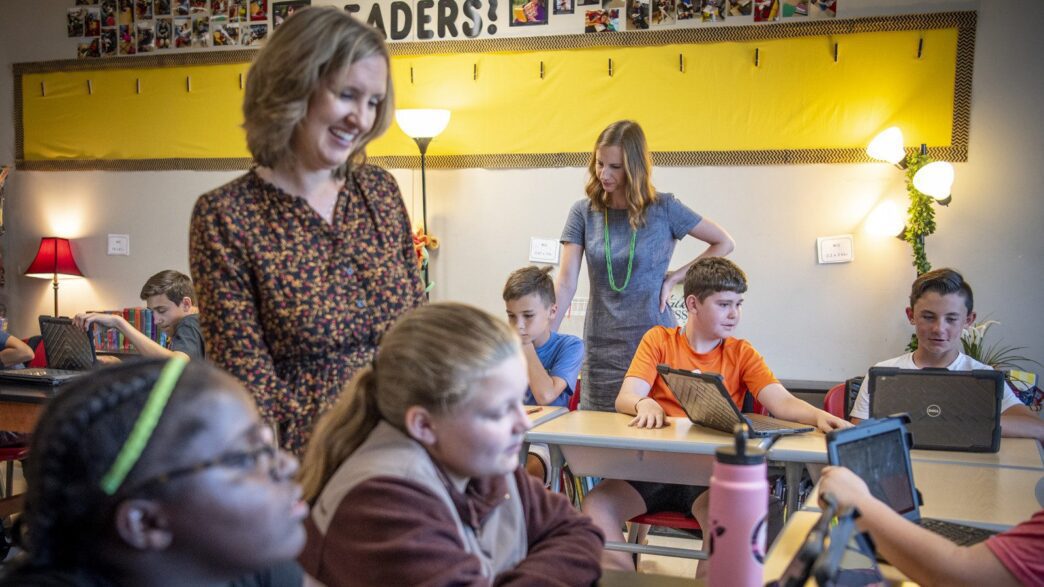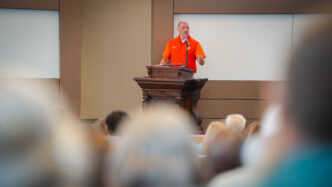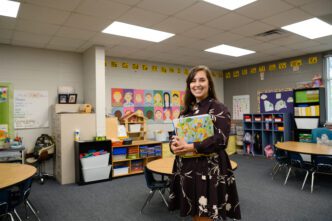For a single day when Amanda Bluhm was five, she wanted to be an ambulance driver. In high school, she flirted with being a wedding planner. These interests were fleeting; they didn’t stick. She had already made it clear from the age of three that she was going to be a teacher.
In elementary school, she turned her parents’ basement into a classroom. There were full-sized whiteboards and small desks arranged in rows. The stuffed animals in those desks received workbooks and homework, most of which Amanda had accumulated from her own teachers when they cleaned out their classrooms at the end of each school year. Her parents printed her first lesson plans from various teaching websites.
“Many trees died so that I could teach empty desks,” Amanda says, laughing. “Teaching was always there; I felt called to do it and I’ve never really wanted to do anything else.”
Amanda didn’t know much about Clemson University when she first visited the campus on a college tour, but says she “just felt good” there, and she could picture herself in its College of Education. When the college introduced its teacher residency program during Amanda’s junior year, she became even happier with her decision to attend Clemson as an education major.

Residency replaces student teaching in a student’s final undergraduate semester with graduate education classes, and the following year is comprised of a year-round teacher residency with an experienced teacher who continuously gathers data about a resident’s progress. Residents emerge after five years with this extended experience as well as a bachelor’s and master’s degree in education.
Amanda knew she wanted to be a part of an innovative program that would immerse her in the classroom from pre-planning to the final day of class. She says the experience has confirmed that teaching is the right profession for her. She’s come out of the experience with a lifelong friend and colleague in her master teacher, Jennifer Eaton. She’s also learned that the most valuable lessons come when challenges arise and things don’t go well.
“Having a full year in the classroom just allows more time for things to go badly,” Amanda says. “It sounds odd to say that’s what I wanted, but I knew that’s how I would learn the most. I’ve learned so much about how to run a classroom, how to improvise and how to look back and learn from a situation that might not have gone perfectly.”
Attached at the hip

Clemson faculty work with students and master teachers to gauge everything from teaching style to personality, so matches are made based on more than just grade level or subject matter. However, this only put a small dent in Amanda’s anxiety when it came time to meet the person with which she would be spend the next year.
That anxiety lessened substantially for both Amanda and Jennifer when they first met at Moe Joe Coffee Co. in Clemson to discuss the upcoming year and what their general approach should be to Jennifer’s sixth-grade classroom. Over the course of that one conversation, Jennifer understood that they had a great deal in common, and she became excited about factoring Amanda into summer preplanning.
“I might not have spent the summer with Amanda planning for the next year if we didn’t click right away, which we did,” Jennifer says. “Her philosophy and approach to teaching were already similar to my own, and she was so professional and put together. I felt very encouraged after that first meeting.”
Jennifer said she came to trust Clemson’s method of matching residents and master teachers early on when Amanda stressed how much she cared about establishing a good rapport with kids, setting expectations and seeing them through with students. After 12 years of teaching, those were the exact same elements that had emerged as Jennifer’s top teaching priorities. The fact that they both grew up dancing, had similar senses of humor and even similar mannerisms certainly didn’t hurt, either.

While Jennifer has been a fifth-grade teacher for the last three years, this was the first year she would tackle sixth grade. Amanda got to see how Jennifer would handle this curve ball, and Jennifer invited Amanda’s expertise and perspective. They knew they had at least one thing in common: neither of them had ever taught a sixth-grade class.
“Amanda really helped me figure out what this sixth-grade class would look like,” Jennifer says. “I was thrilled that she wanted to be a part of that planning, and it was so helpful to have a second set of eyes on the standards we would need to adhere to.”
Gaining confidence
Once the school year began in earnest, Jennifer and Amanda put all their planning into action together. Amanda said that seeing how a seasoned teacher began the school year and set the tone with a new group of students was exciting. She could tell early on that she would benefit from being in the classroom during these early parts of the year instead of coming in later as is the norm in traditional student teaching.
Amanda also knew that the aspects of teaching she needed the most work on would likely reveal themselves soon after the school year began. She says classroom management and dealing with behavior issues was trial and error, and she would occasionally second guess whether or not she picked the right battle or escalated a conflict unnecessarily.
During the first half of the year, Amanda and Jennifer passed a reflection journal back and forth. Amanda would fill it with questions or concerns and give it to Jennifer at the end of the day, and Jennifer would respond to what Amanda had written.

“Our main rule was to be open, because a full year is a long time to spend with someone,” Jennifer says. “Of course, we talked about almost everything that came up, but the journal was a great way to make sure we didn’t miss anything that might have cropped up.”
Amanda says her real test came during the times she took over the class on her own. She had the opportunity to lead the class for two weeks and later five. She says after her two-week takeover in the fall, she was ready to hand the reins back to Jennifer, but her comfort level had increased dramatically by the time she took over for five weeks in the spring.
She said she had to learn that it was okay to not always have everything checked off of her to-do list, especially when much of her advanced planning fell victim to time constraints and delays.
“You can plan two weeks fairly easily, but once you go beyond that and start falling behind here and there, that’s when you start doggy paddling to get back on your feet,” Amanda says. “The extended takeover time really forces you to improvise to stay on track.”
Jennifer says she and Amanda both recognized time management as Amanda’s biggest hurdle in the classroom. Although Amanda’s approach to lesson plans was always good, she would often go for elaborate ideas that would take more time than she realistically had in class. By the time she took over in the spring, Amanda was delivering shorter lessons that managed to factor in her ideas in a more realistic, practical way.
“She felt those frustrations, we talked about it often and I started to see her adjust and grow more confident,” Jennifer says. “Her improvement during those five weeks alone would have made me confident in her as a teacher, but the rest of her time in my classroom has just made her stronger.”
A mutual benefit

Elliott Southard, principal at Mt. Lebanon Elementary, lays most of the credit for his school’s involvement with Clemson’s teacher residency program at Jennifer’s feet. According to Elliott, Jennifer was the one who looked into the program and pursued it, and once she was accepted she outlined the program for him.
The more Elliott learned about the program, the more he was impressed with Clemson’s ability to find master teachers and provide them with information to ensure the success of both master teachers and residents. When Elliott met Amanda, he was encouraged by the caliber of students Clemson attracted to the program.
“I saw how eager she was to teach, and how well she and Jennifer got along,” Elliott says. “When teachers are able to be in the classroom from day one to day 190, it gives them a frame of reference for the entire year; they see it all. I know that Amanda is emerging from this program more prepared than most teachers starting their careers.”
Elliott is excited to welcome a third-grade teacher from Clemson’s second class of teacher residents next year. He wants Mt. Lebanon to continue being involved with the program because of its effect on students, the next generation of teachers and current Mt. Lebanon educators. He wants every teacher in the school to enjoy the benefits that Jennifer has through the program.
Jennifer says that teacher residency has re-energized her as an educator. She says Amanda brought many innovative teaching methods to the table that she had learned or was learning at the time of residency, and Jennifer always tried to find a way to factor them into class.

“Clemson had to go and pair me with one of the biggest overachievers I’ve ever met, but I guess I take that as a compliment since everyone says we’re so similar,” Jennifer says. “With the energy level that Amanda brought, I had to be on my game 24-7. She renewed my love of teaching and made me remember what it should look like.”
Elliott doesn’t mince words about the need for innovative programs such as teacher residency. He knows South Carolina is on the front end of a teacher shortage that is projected to only get worse. He says that not enough people are going into the career and many of those that do aren’t coming into the profession properly prepared. He says it’s going to take the right kind of program to not only fix these problems, but serve as a wake-up call.
“It’s going to be hard for other universities to say this model is not effective,” Elliott says. “School systems are going to see what they get from a new hire coming out of teacher residency, and they’re going to demand that other teacher education programs go in that direction.”
Getting to work
Amanda has already landed a job at Mount Gallant Elementary School in Rock Hill, South Carolina as a fourth-grade teacher. She’s happy that she’ll be able to stay in a state that needs teachers, and she’s looking forward to running her own classroom.
She doesn’t ignore the talk of teacher pipeline issues; she knows it’s an issue for students and communities in the state, and she’s okay with the pressure that goes along with that. If anything, the residency program has given her a realistic view of the profession and motivated her to keep her focus on what she can do for her students in the classroom.
“I think it’s unfortunate that many people view the teaching profession in a negative light when it should only be elevated,” Amanda says. “It’s not an easy job, and it can be exhausting, but I’ve felt how rewarding it is to pour your entire self into a child’s success and help them get there. I’m excited to do that in my classroom and be a part of a school community that makes that a priority.”
Amanda also knows she has at least one educator friend in the upstate who will be there to give her advice when she needs it. Jennifer has plans to help Amanda complete the initial set up of her fourth-grade classroom in Rock Hill shortly before the year begins, and they’ve both committed to monthly “appointments” to meet somewhere halfway between Mount Gallant and Mt. Lebanon.
Amanda plans to keep in touch with Jennifer not just to talk shop, but so they can continue talking about their shared love of “Hamilton.” Amanda has enjoyed holding the fact that she’s seen it live over Jennifer’s head all year.
Meanwhile, Jennifer says she is going to have to relearn how to teach on her own. She considers herself spoiled; she has grown very comfortable with Amanda’s support and help as a co-teacher. Jennifer says she’d love to engage in the teacher residency program again even though Amanda has set the bar for a resident incredibly high.
“I hope that Mount Gallant understands who they’re getting in Amanda,” Jennifer says. “She’ll be dedicated from day one to what’s best for those kids, and she’s got so many tricks up her sleeve. Amanda will make them want to come to school every day and she’ll make them love learning.”
END









